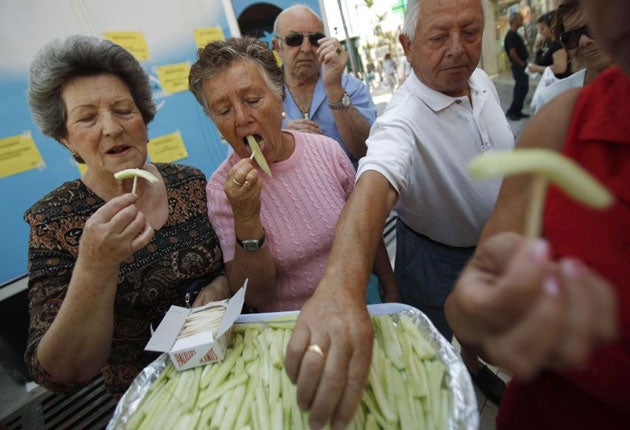E.coli: panic grips Germany while Britain waits nervously
Crisis 'not over yet' say health officials

Hospitals in Germany have appealed to the public for more blood donations, as the number of new victims of E.coli rose to almost 100 a day.
The Robert Koch Institute, the main health body investigating the outbreak, said 18 people had been killed by the bug in Germany in the past two weeks. In addition, one person in Sweden has died and more than 1,800 others have been infected around the world.
Four new cases were identified in the UK yesterday, bringing the total to 11 people being treated for the infection. All are from or have visited northern Germany, where experts are desperately working to find the source of the outbreak.
The Koch Institute said hospitals had registered 199 new E.coli infections in Germany since Wednesday and that in 50 of the cases, patients had developed the potentially lethal haemolytic-uraemic syndrome (HUS), a follow-on condition which damages the kidneys and nervous system.
Dr Reinhard Brunkhorst, a leading kidney specialist involved with combating the epidemic, told reporters in Hamburg that hospitals were now seeing fewer new infections reported each day, though cautioned that "it may be less, but it's not over yet".
"There is no reason for hysteria, because it's not spreading and it's not increasing – it's decreasing," he said. He added that specialist treatments given to some patients appeared to be working: "This is just an impression, and it is not the result of a clinical study," he added.
The bug has now also been identified in people in the Czech Republic, France and the United States, as well as Austria, Denmark, the Netherlands, Spain, and Switzerland.
The Health Protection Agency in the UK has issued a warning urging people travelling to Germany to avoid eating raw tomatoes, cucumbers and leafy salad. It has urged anyone returning from Germany with an illness, including bloody diarrhoea, to seek medical attention.
The World Health Organisation announced on Thursday that its scientists had established that the E.coli bacteria causing the epidemic was not of a type usually associated with such outbreaks. It said its source was a hitherto unknown "aggressive" strain which appeared to have resulted from two E.coli types being crossed. The mutant strain causes dysentery and can seriously damage the nervous system, leading to epileptic fits in severe cases.
Health officials said they were optimistic that the WHO's findings would help them to stop the epidemic. "We hope to find ways of preventing further infections over the coming week," said Professor Dag Harmsen of Münster University Clinic. "We think we will soon have collected enough data to establish what is making this clone so aggressive," he added.
But officials said they still had no idea which food products were carrying the bacteria. The Robert Koch Institute has admitted that the food source "may never be known".
Health investigators have focused on a group of women trade unionists who attended a conference in the city of Lübeck in mid May, where several of them became infected with the bacteria at the same time. But scientists have not been able to find the source of that outbreak.
Andreas Hensel, the head of Germany's Institute for Risk Assessment, said that in the majority of epidemics recorded it had proved impossible to "fish out" the exact source.
In northern Germany, where the epidemic is centred, there was no indication that the crisis was easing. In Hamburg, the city worst hit by the outbreak, the head of the blood donations service issued a fresh public appeal for donors. The city's Eppendorf University Clinic, where the bulk of victims are being treated, has been using blood transfusions to "wash" patients' systems clean of the bacteria. The clinic announced that its stocks were running low. "The stocks need to be replenished," said Lutz Schmidt, Hamburg's chief medical officer.
The Bild newspaper reported last night that police in Hamburg were investigating two food retailers and a restaurant on suspicion that they had sold contaminated vegetables. "The investigation is in connection with the contaminated cucumbers," police told the newspaper.
The cause of the outbreak was initially wrongly sourced to imported Spanish cucumbers which were found to carry some E.coli bacteria, but not the aggressive mutant strain. The incorrect diagnosis prompted several countries to ban the import of Spanish cucumbers. Russia banned all EU vegetable imports. Chancellor Angela Merkel sought to calm Spanish fury by telephoning her Spanish counterpart Jose Luis Rodriguez Zapatero yesterday. Spanish fruit and vegetable exporters have said they have lost some 200m euros a week as a result of the ban and that tens of thousands of kilos of produce are being destroyed.
Join our commenting forum
Join thought-provoking conversations, follow other Independent readers and see their replies
Comments
Bookmark popover
Removed from bookmarks